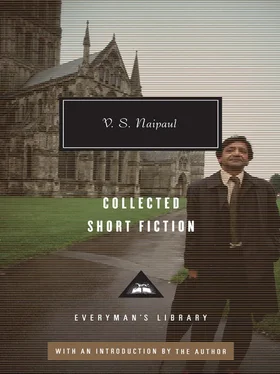Then it was night again. The useless lights had meaning. Against the black sky blacker points moved endlessly: all the birds of the island, flying south. It was like the final abandonment. We were in the midst of noise, in which it was at times possible to distinguish the individual groans of houses, trees, and the metallic flapping of loose corrugated-iron sheets. No fear on any face, though. Only wonder and expectation.
The television screens shimmered. Priest reappeared, tired, shining with fatigue, telling us what we already knew, that the end of our world was at hand.
‘Behold,’ he said, ‘now is the day of salvation.’
The city responded. Faintly at first, like distant temple bells, the sound of steel orchestras came above the roar of the wind. The pariah dogs, and those dogs that lived in houses, began to bark in relay, back and forth and crossways. Feet began to shuffle. Priest railed like a seer, exhausted by the effort of concentration. He railed; the city was convulsed with music and dance.
The world was ending and the cries that greeted this end were cries of joy. We all began to dance. We saw dances such as we had seen in the old days in Henry’s yard. No picking of cotton, no cutting of cane; no carrying of water, no orchestrated wails. We danced with earnestness. We did contortions of which we had never thought ourselves capable.
We saw Blackwhite dancing with Leonard. Blackwhite not white, not black, but Blackwhite as we all would have liked to see him, a man released from endeavour, released from the strain of seeing himself (portrait of the artist: the tribal subconscious), at peace with the world, accepting, like Leonard. We saw Bippy, Tippy and Chippy arm in arm with Pablo, Sandro and Pedro, as though the wooing that had begun at The Coconut Grove had gone on all night: a gesture now without meaning, a fixed attitude of ritual in which news of the hurricane had caught them all. Occasionally the men from Foundationland pleaded with Blackwhite. Still, without malice or triumph, he spurned them, and did stylized stamps of simple negation: a private man, at last. As on a flat stage, stretching to infinity before our eyes, infinity the point where the painted floorboards met, companionship and wooing and pursuit and evasion played back and forth before us. But Leonard, obstinately dancing, dancing with earnestness, like the man anxious to catch the right mood and do the right thing: Leonard remained, in spite of his exertions, what he had always been, bemused, kind, blank. Arm in arm he danced with Blackwhite whenever they met; and Sinclair, big, heavy Sinclair, swung between them. And the tourist teams of the day before: the happy now like people who had forgotten the meaning of the word, which implied an opposite, the embittered, oh, infinitely less so. And for me, no terror of sky and trees: the courage of futility, the futility of courage, the empty, total response.
Through the streets, flattened to stage-boards, we danced, waiting for the final benediction. The sky hung low, grew high, hung low. The wind sweetly filled our ears, slackened, filled our ears again. We danced and waited. We waited and danced.
Benediction never came. Our dancing grew listless. Fatigue consumed anguish. But hope was not entirely consumed, even when on the television sets we saw Priest being transformed into Priestland, the seer into the newscaster, the man whose thoughts had only been of death, into the man who diminished life. But how could we deny?
We gave up the hurricane. We sat in the streets. Light was grey, then silver. The stage was becoming a street again; house took on volume. I heard Bippy, Tippy and Chippy wailing. Pablo and the boys comforted them.
Sinclair straightened his jacket and tie. In the light of a day that had now truly broken he went to Leonard, detached him from Blackwhite, and said, ‘Come, Leonard. Come, boy. We have had our fun. It is time to go home!’
‘Goodbye, Mr White,’ Leonard said. ‘Very well, Sinclair. You have been very good. Let us go.’
Blackwhite saw and understood. ‘Leonard!’ he said, stupefied. ‘Leonard, what about my black novel? You promised help. You drove away the men from Foundationland. You said I was to want for nothing.’
‘Goodbye, Mr White. How are you feeling, Sinclair?’
‘Leonard! You promised support! Bippy, Tippy, Chippy. Wait, wait. Pablo, call off your idlers! Pablo! Bippy! Mr Tippy! Mr Chippy!’
He, once the pursued, now became the pursuer. Pablo, Sandro and Pedro fled before him, as did Bippy, Tippy and Chippy. He pursued them; they evaded him and often the six came together. On the stage stretching to infinity the chase took place, pursuer and the six pursued dwindling to nothing before us. The sun was bright; there were shadows.
I went with Selma to The Coconut Grove. Henry was cleaning up the kitchen. Emelda stood over him. He rearranged plastic flowers; he put broken vases together.
On the television set Gary Priestland was announcing that the hurricane had not come. But he had news for us, news of the destruction of some other island. He had news. He had facts and the figures of death. He had stills.
In the harbour the ships blew the all-clear.
The Ma-Ho girls came on and did a commercial for a local cigarette.
The programmes for the day were announced.
‘Home,’ Selma said.
‘The old driftwood calls. Lovely things can be found in Nature.’
‘Gary will be tired.’
‘I’ll say.’
And in the city where each exhausted person had once more to accommodate himself to his fate, to the life that had not been arrested, I went back to the hotel.
Hilton, Hilton.
Sailing 1 p.m. , the board said in the lobby.
Moore-McCormack, Moore-McCormack.
August 1965
Prologue, from a Journal: The Tramp at Piraeus
IT WAS ONLY a two-day crossing from Piraeus to Alexandria, but as soon as I saw the dingy little Greek steamer I felt I ought to have made other arrangements. Even from the quay it looked overcrowded, like a refugee ship; and when I went aboard I found there wasn’t enough room for everybody.
There was no deck to speak of. The bar, open on two sides to the January wind, was the size of a cupboard. Three made a crowd there, and behind his little counter the little Greek barman, serving bad coffee, was in a bad mood. Many of the chairs in the small smoking-room, and a good deal of the floor space, had been seized by overnight passengers from Italy, among them a party of overgrown American schoolchildren in their mid-teens, white and subdued but watchful. The only other public room was the dining-room, and that was being got ready for the first of the lunch sittings by stewards who were as tired and bad-tempered as the barman. Greek civility was something we had left on shore; it belonged perhaps to idleness, unemployment and pastoral despair.
But we on the upper part of the ship were lucky. We had cabins and bunks. The people on the lower deck didn’t. They were deck passengers; night and day they required only sleeping room. Below us now they sat or lay in the sun, sheltering from the wind, humped figures in Mediterranean black among the winches and orange-coloured bulkheads.
They were Egyptian Greeks. They were travelling to Egypt, but Egypt was no longer their home. They had been expelled; they were refugees. The invaders had left Egypt; after many humiliations Egypt was free; and these Greeks, the poor ones, who by simple skills had made themselves only just less poor than Egyptians, were the casualties of that freedom. Dingy Greek ships like ours had taken them out of Egypt. Now, briefly, they were going back, with tourists like ourselves, who were neutral, travelling only for the sights; with Lebanese businessmen; a troupe of Spanish night-club dancers; fat Egyptian students returning from Germany.
Читать дальше









